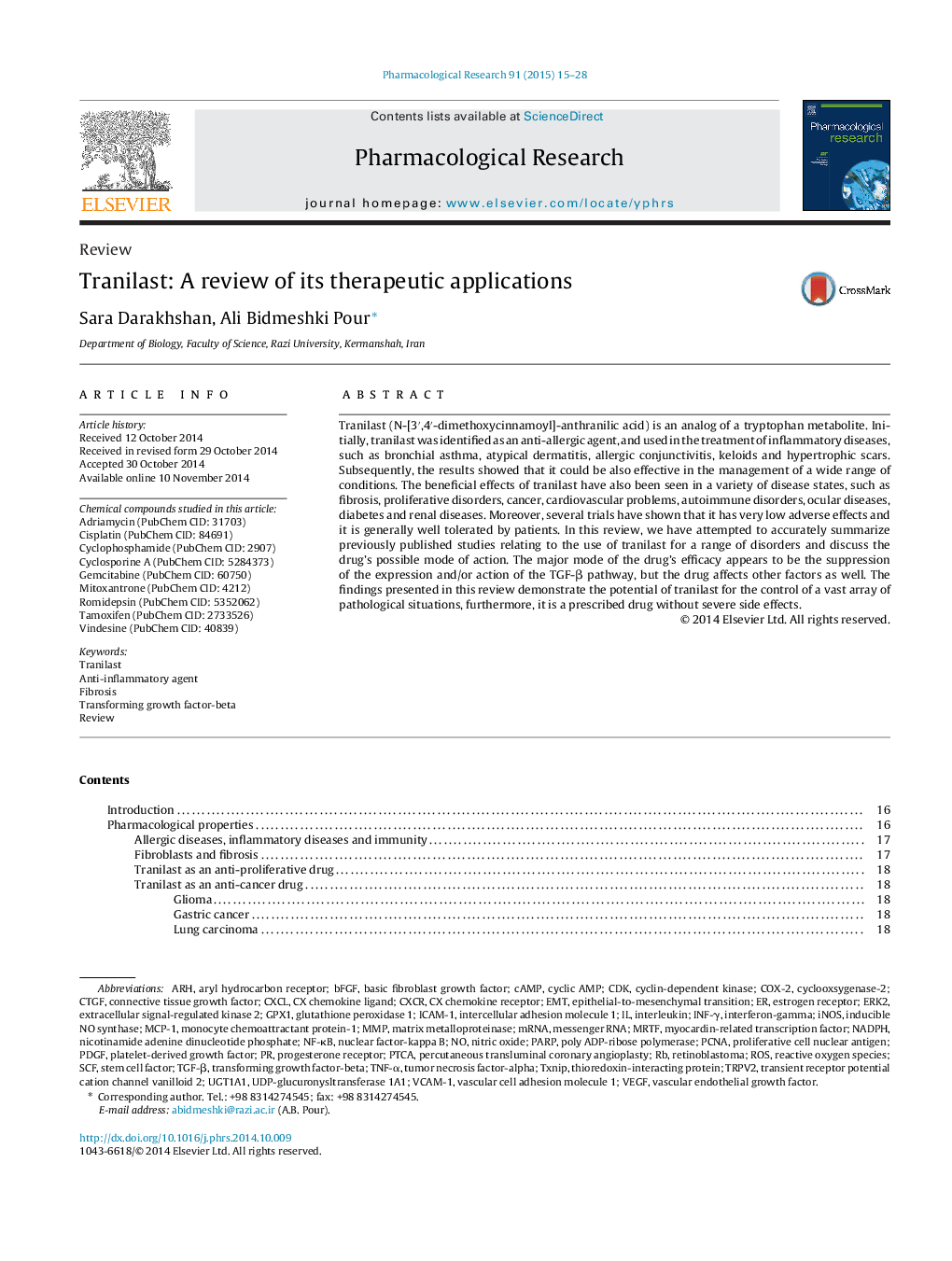| Article ID | Journal | Published Year | Pages | File Type |
|---|---|---|---|---|
| 5843077 | Pharmacological Research | 2015 | 14 Pages |
Abstract
Tranilast (N-[3â²,4â²-dimethoxycinnamoyl]-anthranilic acid) is an analog of a tryptophan metabolite. Initially, tranilast was identified as an anti-allergic agent, and used in the treatment of inflammatory diseases, such as bronchial asthma, atypical dermatitis, allergic conjunctivitis, keloids and hypertrophic scars. Subsequently, the results showed that it could be also effective in the management of a wide range of conditions. The beneficial effects of tranilast have also been seen in a variety of disease states, such as fibrosis, proliferative disorders, cancer, cardiovascular problems, autoimmune disorders, ocular diseases, diabetes and renal diseases. Moreover, several trials have shown that it has very low adverse effects and it is generally well tolerated by patients. In this review, we have attempted to accurately summarize previously published studies relating to the use of tranilast for a range of disorders and discuss the drug's possible mode of action. The major mode of the drug's efficacy appears to be the suppression of the expression and/or action of the TGF-β pathway, but the drug affects other factors as well. The findings presented in this review demonstrate the potential of tranilast for the control of a vast array of pathological situations, furthermore, it is a prescribed drug without severe side effects.
Keywords
TXNIPCTGFiNOSMCP-1ARHPARPSCFPDGFUGT1A1CXCLVCAM-1tranilastGPx1ERK2CXCRPTCAINF-γCyclosporine A (PubChem CID: 5284373)Tamoxifen (PubChem CID: 2733526)Cyclophosphamide (PubChem CID: 2907)MRTFAdriamycin (PubChem CID: 31703)TRPV2Myocardin-related transcription factorPCNATGF-βICAM-1NF-κBCDKMMPmRNAbFGFNADPHCOX-2cyclic AMPcAMPinducible NO synthasemessenger RNAROSproliferative cell nuclear antigenPercutaneous transluminal coronary angioplastyinterferon-gammainterleukintransforming growth factor-betatumor necrosis factor-alphaEMTextracellular signal-regulated kinase 2retinoblastomaAnti-inflammatory agentVascular endothelial growth factorVascular Endothelial Growth Factor (VEGF)Connective tissue growth factorplatelet-derived growth factorbasic fibroblast growth factorStem Cell FactorTNF-αNuclear factor-kappa BFibrosismatrix metalloproteinaseReviewIntercellular adhesion molecule 1Vascular cell adhesion molecule 1Nitric oxidenicotinamide adenine dinucleotide phosphatethioredoxin-interacting proteinmonocyte chemoattractant protein-1poly ADP-ribose polymerasecyclin-dependent kinaseepithelial-to-mesenchymal transitionglutathione peroxidase 1Reactive oxygen speciesaryl hydrocarbon receptorEstrogen receptorProgesterone receptor
Related Topics
Health Sciences
Pharmacology, Toxicology and Pharmaceutical Science
Pharmacology
Authors
Sara Darakhshan, Ali Bidmeshki Pour,
